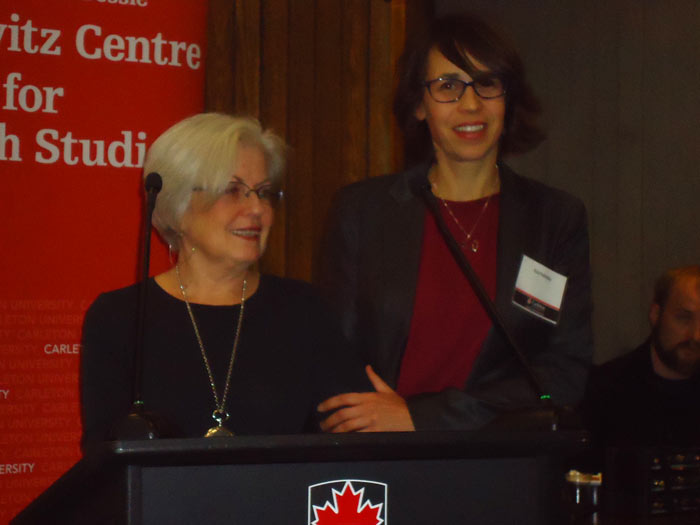Members of the Centre for Holocaust Education and Scholarship (CHES) committee, survivors and donors gathered in the Senate Chambers of Carleton University on November 16th to celebrate the completion of the survivors’ testimony project. CHES launched the Ottawa survivors’ testimonial film with the screening of a 30-minute excerpt of the survivors’ interviews. The survivors who participated in the project included Elly Bollegraaf, Tova Clark, Judy Young Drache, Jessica Fiksel, Vera Gara, Dr. Agnes Klein, Raoul Korngold, Cantor Moshe Kraus, Kati Morrison, and David Moscovic. A fortuitous encounter between CHES director, Mina Cohn, and film director, Koa Padolsky, resulted in a collaboration of the highest and most professional level. Ms Cohn also acknowledged the sensitivity and expertise of the Media Department of Carleton University.
Thanks to the generosity of many donors, and with the administrative help of Carleton University’s “FutureFunder” Program, ten half-hour films, one for each survivor, were recorded and produced using the latest in technology. These made- in-Ottawa films detail the survivors’ experiences before, during, and after the Holocaust. They include different survival experiences: some who survived ghettos in Hungary, others who endured Nazi slave labor camps in Germany and death camps in Poland, some who hid in non-Jewish homes in Holland and France, others who found shelter in a dugout in the Ukraine, and those who sought refuge in Romania and Shanghai. Each story is distinct and, in its own way, offers a glimpse into what it must have been like to live through the traumatic events of the Holocaust.

In her opening remarks Ms. Cohn stated, “The awareness that there is no substitute for the survivors’ personal accounts of the horrors and trauma of the Holocaust and the understanding that Holocaust survivors are aging and many are no longer able to bring their personal stories to educational institutions, compelled us to embark on this project and professionally record on film the testimonies of Ottawa Holocaust Survivors. Each survivor has a unique and personal story to tell. While many Ottawa survivors have actively participated in telling their stories in a variety of settings, others have never spoken about their experiences. An initiative that would include them seemed vital and urgent.”
Not only are the films historical and intended as testimonies but they are also pedagogical in nature. One of the main initiatives of the Centre for Holocaust Education and Scholarship is to ensure the continuity of Holocaust education through the active involvement of survivors and their descendants.
Mina Cohn also stated that the goal of the project was:
- To bring to the forefront the experiences and voices of Ottawa Holocaust survivors.
- To preserve their testimonies for future generations.
- To create a resource that will benefit not only teachers and historians but researchers of many disciplines.
- And to create a unique, Ottawa-based, collection of Holocaust testimonies.
The ten-edited half hour testimonial films will be available on the Centre for Holocaust Education and Scholarship website. As well, on the same website are the 2-minute sound bites produced by CHES that educators can use in today’s educational settings. It is important to recognize that the attention span of students today is very short. Following the global technical shift from analog to digital video, today’s students expect a high-definition digital presentation in short bites. Both the half hour testimonials and the two minute soundbites will be available on Carleton YouTube. They will make a powerful free educational resource for teachers. The film interviews in their entirety will be kept at the archives of McOdrum Library of Carleton University and will be available to researchers, students and teachers as well as the public.
CHES’s mandate is to offer year round educational programs and activities that will promote a deeper understanding of the history and legacy of the Holocaust. Its purpose is to combat prejudice and racism and promote respect for diversity, social justice and human rights. This objective is even more critical in light of the recent wave of hate crimes that have been perpetrated in the Ottawa area towards religious institutions.